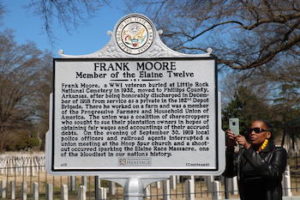
*On this date in 1923, Moore et al. v. Dempsey was decided.
This was a United States Supreme Court case in which the court ruled 6–2 that the defendants' mob-dominated trials deprived them of due process guaranteed by the Due Process Clause of the Fourteenth Amendment.
Moore v. Dempsey was the first case to come before the court in the 20th century related to the treatment of Blacks in the criminal justice systems of the Jim Crow South, where they lived in a segregated society that had disenfranchised them. The case resulted from the prosecution of twelve men for the death of a white man associated with the Elaine Race Riot in Phillips County, Arkansas. A white railroad security employee died on September 30, 1919, after shots were exchanged outside a church where a Black tenant farmers union was meeting.
With rumors of Black insurrection, Governor Charles Hillman Brough led the deployment of federal troops into the rural county, arresting hundreds of Blacks. Other Blacks were allowed to be in public only with military passes. The week after the shooting, roving bands of whites and federal troops killed upwards of 200 Blacks. In the aftermath, a grand jury of local landlords and merchants decided who would be indicted. Those Blacks willing to testify against others and who agreed to work on whatever terms their landlords set for them were let go; those who had been labeled ringleaders or were judged unreliable were indicted.
According to the affidavits later supplied by the defendants, many of the prisoners had been beaten, whipped, or tortured by electric shocks to extract testimony or confessions and threatened with death if they later recanted their testimony. Indictments were brought against 122 defendants, including 73 for murder. On November 2, 1919, the Phillips County authorities began trying the defendants on charges of murder.
Frank Hicks was charged with the first-degree murder of Clinton Lee, with Frank Moore, Ed Hicks, J. E. Knox, Paul Hall, and Ed Coleman charged as accessories. Hicks and a total of eleven defendants were sentenced to death after token trials: counsel for the accused, who did not meet their clients until the trial began, called no witnesses, produced no evidence, and did not call on the defendants to testify. The first trial took three-quarters of an hour, after which the all-white jury returned a guilty verdict on the first-degree murder charge in eight minutes.
Later trials were just as short; the juries took less than ten minutes to reach a verdict in each case. Several weeks after the jury deliberated for four minutes, a twelfth defendant was sentenced to death. Thirty-six other defendants chose to plead guilty to second-degree murder rather than face trial. Sixty-seven additional defendants went to trial and were convicted and sentenced to various terms of imprisonment.
White mobs dominated the trials; crowds of armed whites milled around the courthouse. Justice Holmes later stated, "There was never a chance of an acquittal," as the jurors feared the mob. The Arkansas Gazette applauded the trials as the triumph of the 'rule of law,' as none of the defendants had been lynched and reversed the district court's decision, declining the petitioners' writ of habeas corpus. This case was a precedent for the Supreme Court's review of state criminal trials regarding their compliance with the Bill of Rights.